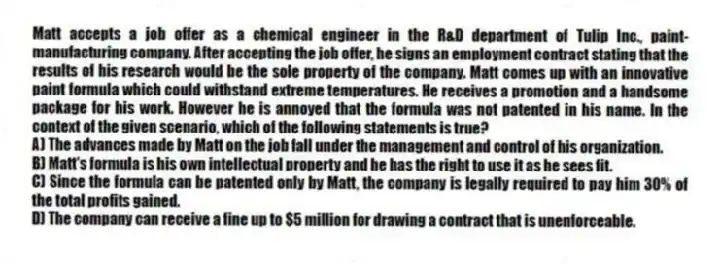
Matt accepts a job offer as a chemical engineer in the R&D department of Tulip Inc., paint-manufacturing company. After accepting the job offer, he signs an employment contract stating that the results of his research would be the sole property of the company. Matt comes up with an innovative paint formula which could withstand extreme temperatures. He receives a promotion and a handsome package for his work. However he is annoyed that the formula was not patented in his name. In the context of the given scenario, which of the following statements is true?
A) The advances made by Matt on the job fall under the management and control of his organization.
B) Matt's formula is his own intellectual property and he has the right to use it as he sees fit.
C) Since the formula can be patented only by Matt, the company is legally required to pay him 30% of the total profits gained.
D) The company can receive a fine up to $5 million for drawing a contract that is unenforceable.
Correct Answer:
Verified
Q4: Roger is hired by an international HR
Q5: Individuals outside the normal chain of command
Q6: Having a "just cause" for employment-related action
Q7: Rachel manages a team of ten designers
Q8: The process of deliberately making conditions intolerable
Q10: Explicit employment contracts are more likely to
Q11: Amber is working as a sales associate
Q12: An employer is guilty of _ if
Q13: Grace is asked by her employer to
Q14: Claudia, when selected as a senior engineer
Unlock this Answer For Free Now!
View this answer and more for free by performing one of the following actions

Scan the QR code to install the App and get 2 free unlocks

Unlock quizzes for free by uploading documents